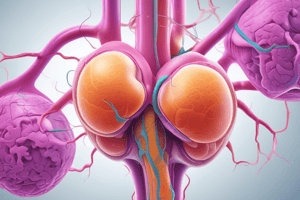Podcast
Questions and Answers
What is the main purpose of a Barium swallow exam?
What is the main purpose of a Barium swallow exam?
- To examine the motility of the lower GI tract
- To examine the motility of the upper GI tract (correct)
- To cause intestinal irritation to stimulate peristalsis
- To promote complete evacuation of feces from the colon
What might happen if cathartics and laxatives are overtaken?
What might happen if cathartics and laxatives are overtaken?
- Reduced risk of constipation
- Increased absorption of nutrients in the intestines
- Enhanced bowel motility and heightened response to sensory stimulus
- Impaired bowel motility and decreased response to sensory stimulus (correct)
Which type of enema exerts higher osmotic pressure than fluids?
Which type of enema exerts higher osmotic pressure than fluids?
- Normal saline enema
- Tap water enema
- Oil retention enema
- Hypertonic solution enema (correct)
What is the main purpose of using NG tubes for lavage?
What is the main purpose of using NG tubes for lavage?
When should healthcare providers use cathartics and laxatives?
When should healthcare providers use cathartics and laxatives?
What type of urinary diversion requires the patient to self-catheterize for the rest of their life?
What type of urinary diversion requires the patient to self-catheterize for the rest of their life?
Which type of diversion results in the patient not having control and requiring a collection pouch?
Which type of diversion results in the patient not having control and requiring a collection pouch?
What is the purpose of a Foley Catheter?
What is the purpose of a Foley Catheter?
Which condition is characterized by infrequent stools or hard, dry, and small stools?
Which condition is characterized by infrequent stools or hard, dry, and small stools?
Where does an End colostomy usually occur?
Where does an End colostomy usually occur?
Flashcards are hidden until you start studying
Study Notes
Renal System: Urinary Diversions
- Urinary diversions can be temporary or permanent and involve the creation of a stoma using a section of intestine
- Continent diversions include:
- Continent urinary reservoir: patient must self-catheterize for the rest of their life and has control
- Orthotopic neobladder: ileal pouch replaces the bladder and the patient voids through the urethra
- Incontinent diversions include:
- Ureterostomy: requires a collection pouch and the patient has no control
- Nephrostomy tubes: tubes come out of the back from the kidneys and are used when the ureters are obstructed
Basic GI Anatomy and Function
- Factors that affect bowel elimination in patients include:
- Age
- Fluid intake
- Position during defecation
- Pregnancy
- Medications
- Diet
- Physical activity
- Pain
- Mobility
Bowel Elimination Vocabulary
- Constipation: a symptom characterized by infrequent stools or hard, dry, and small stools
- Impaction: unrelieved constipation resulting in a collection of hardened feces wedged in the rectum
- Diarrhea: an increase in the number of stools or unformed feces
- Incontinence: inability to control feces
- Flatulence: accumulation of gas in the intestines causing the walls to stretch
- Hemorrhoids: dilated veins in the lining of the rectum
Bowel Diversions
- Ileostomy/colostomy: surgical opening of the ileum or colon
- Types of colostomy include:
- Sigmoid colostomy: more formed stool
- Transverse colostomy: thick liquid to soft consistency stool
- End colostomy: usually on the left side, colon is severed and brought to the skin
- Loop colostomy: reversible stoma, 2 openings
- Antegrade continence enema: enema through a catheter in the abdominal wall (some pediatrics)
- WOCN: Wound Ostomy Continence Nurse
Diagnostic Exams
- Colonoscopy: surgery of the lower GI tract (large intestine, colon, and rectum)
- Endoscopy: surgery of the upper GI tract (esophagus, stomach, and small intestine)
- Barium swallow: examination of the motility of the GI tract
- CT and MRI scans: diagnostic imaging tests
- Fecal specimens: tests for bowel function and disorders
Cathartics, Laxatives, and Antidiarrheals
- Cathartics: stronger and more rapid effect on the intestines than laxatives and suppositories
- Laxatives: empty the bowel (not long-term use)
- Overtaking cathartics and laxatives may cause impaired bowel motility and decreased response to sensory stimulus
- Cathartics and laxatives are used for GI tests, surgery, and constipation
- Antidiarrheals: treat the cause (specific) or symptoms (nonspecific) of diarrhea
Enemas
- Cleansing enemas: promote complete evacuation of feces from the colon
- Types of enemas include:
- Tap water enema: hypotonic, lower osmotic pressure than fluids
- Normal saline enema: isotonic, same osmotic pressure as fluids
- Hypertonic solutions enema: pulls fluid out, beneficial for patients unable to tolerate large volumes of fluid
- Soap suds enema: causes intestinal irritation to stimulate peristalsis
- Oil retention enema: lubricates the feces to make it easier to pass
- Carminative and kayexalate enema: relieves gaseous distension and causes diarrhea to bring potassium down
- Digital removal of stool: last resort
Studying That Suits You
Use AI to generate personalized quizzes and flashcards to suit your learning preferences.



